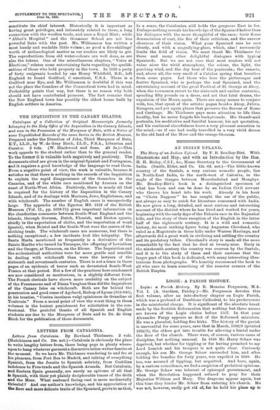Catalogue of a Collection of Original Manuscripts formerly belonging to
the Holy Office of the Inquisition in the Canary Islands, and now in the Possession of the Marquess of Bute, with a Notice of some Unpublished Records of the same Series in the British Museum. Prepared under the Direction of John, Third Marquess of Bute, K.T., LL.D., by W. de Gray Birch, LL.D., F.S.A., Librarian and Curator. 2 vols. (W. Blackwood and Sons. -a 3s.)—This work appeals to the student rather than to the general reader. To the former it is valuable both negatively and positively. The documents cited are given in the original Spanish and Portuguese, and it requires a good knowledge of the language to read them. From a negative point of view, the work is valuable, because it satisfies us that there is nothing in the records of the Inquisition to explain the rapid disappearance. of the Guanches in the Canaries, and of the white race mentioned by Azurara on the coast of North-West Africa. Positively, there is nearly all that is required for the history of the Inquisition in the Canary Islands, and of its dealings with Moriscos, Jews, Englishmen. and with witchcraft. The number of English cases is unexpectedly large. The appendix of the Egerton MS. 1512 of the British Museum (Vol IL, pp. 1018-71) gives important information on the clandestine commerce between South-West England and the islands, through German, Dutch, Flemish, and Breton agents, chiefly in the exportation of cloths, and the importation of woad (pastel), when Bristol and the South-West were the centre of the clothing trade. The witchcraft cases are numerous, but there is nothing exceptional ; a few incidents look like telepathy. The Santa Marta mentioned so frequently is a derivative of the Sainte Marthe who tamed La Tarasque, the offspring of Leviathan and the Onogre, at Tarascon, on the Rhone. The Inquisition and the ecclesiastical authorities were far more gentle and sensible in dealing with witchcraft than were the lawyers of the sixteenth and seventeenth centuries. There is not a trace in these pages of an epidemic of terror such as devastated South-West France at that period. Not a few of the practices here condemned are now considered as meritorious, in a slightly different form. The French clericals have shown more credulity on the subject of the Freemasons and of Diana Vaughan than did the Inquisitors of the Canary Isles on witchcraft. Both are far behind the penetration and good sense of Agobard, Bishop of Lyons (813-840), in his treatise, " Contra insulsam vulgi opinionem de Grandine et Tonitruis." From a moral point of view the worst thing in these volumes is the lenient punishment for solicitation in the con- fessional. The grateful thanks of all Spanish and English students are due to the Marquess of Bute and to Dr. de Gray Birch for the publication of these documents.


















































 Previous page
Previous page